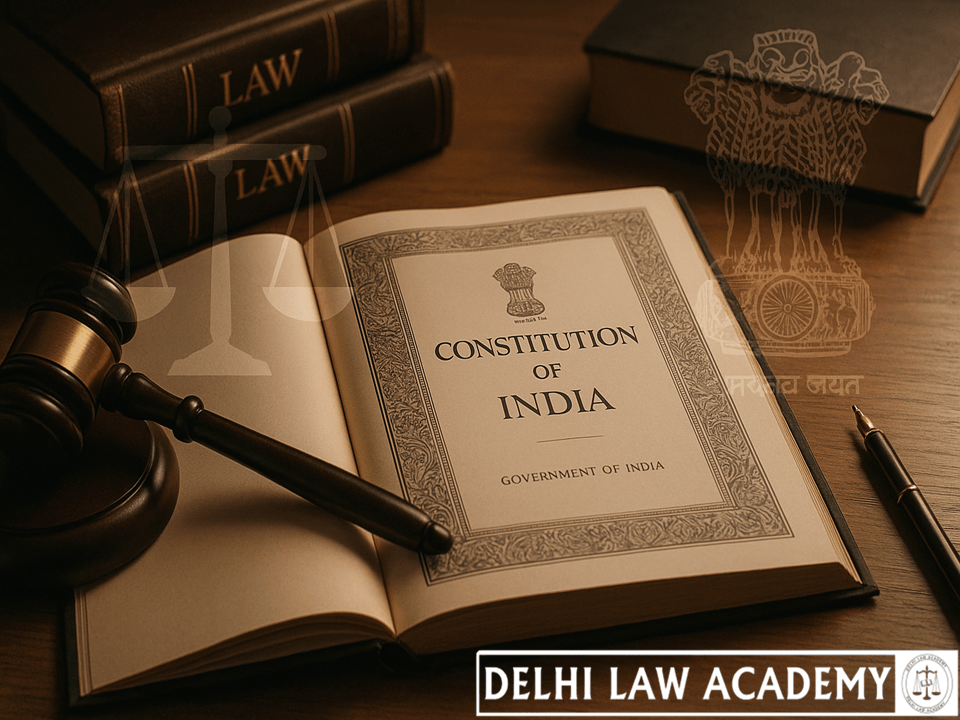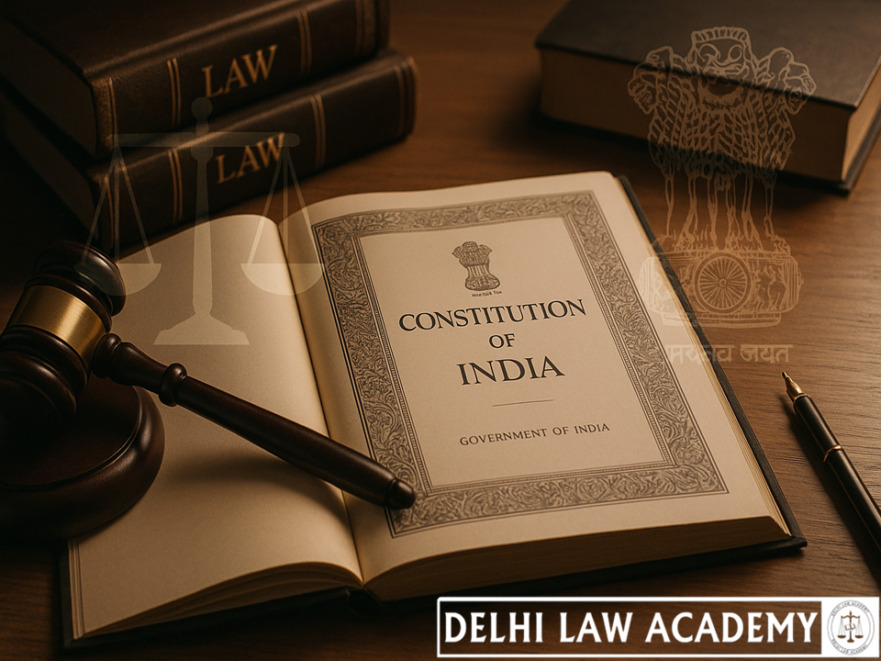
📘 S. Shobha v. Muthoot Finance Ltd. (2025 INSC 117) – Writs Against Private Entities
Delhi Law Academy Jaipur presents below for aspirants of RJS, DJS, PCS (J) and other Judicial Services throughout India a summarized version of the Supreme Court judgment in the case of S. Shobha v. Muthoot Finance Ltd. answering the question whether a writ can be issued u/a 226 to a private entity/person and if yes, in what cases.
📜 Case Law: S. Shobha v. Muthoot Finance Ltd. (2025 INSC 117)
S. Shobha v. Muthoot Finance Ltd. [2025 INSC 117]
Article 226
TOPICS:
• Who can be a respondent in a writ petition u/a 226?
• Against whom can a writ be issued by a High Court under article 226?
• CAN A WRIT BE ISSUED U/A 226 TO A PRIVATE ENTITY/PERSON? IF YES, IN WHAT CASES?
Case Law on Article 226
2. The High Court in its impugned order has observed in para 5 as under:-
“5. While the Court examined the appeals and considered the controversy raised in the petitions, a conspicuous aspect surfaced that the petitions were filed against the Company named Muthoot Finance Limited. Admittedly, the respondent – Company is a Company registered under the Companies Act, 1956. It does not answer the definition of “State” within meaning of Article 12 of the Constitution. Nor the transaction of loan by pledging gold between the petitioner and the respondent could be said to be involving any public function or could be said to be in the public realm. Also the Company is not discharging any function which has the trapping of sovereign function. Respondent – Company is a Private Company registered under the law. It is not a “State”.”
3. The Division Bench of the High Court is right in taking the view that Muthoot Finance Ltd. is not a “State” within the meaning of Article 12 of the Constitution and therefore not amenable to writ jurisdiction of the High Court under Article 226 of Constitution.
7. Applying the above test, the respondent herein cannot be called a public body. It has no duty towards the public. It’s duty is towards its account holders, which may include the borrowers having availed of the loan facility. It has no power to take any action, or pass any order affecting the rights of the members of the public. The binding nature of its orders and actions is confined to its account holders and borrowers and to its employees. Its functions are also not akin to Governmental functions.
8. A body, public or private, should not be categorized as “amenable” or “not amenable” to writ jurisdiction. The most important and vital consideration should be the “function” test as regards the maintainability of a writ application. If a public duty or public function is involved, any body, public or private, concerned or connection with that duty or function, and limited to that, would be subject to judicial scrutiny under the extraordinary writ jurisdiction of Article 226 of the Constitution of India.
9. We may sum up thus:
- (1) For issuing writ against a legal entity, it would have to be an instrumentality or agency of a State or should have been entrusted with such functions as are Governmental or closely associated therewith by being of public importance or being fundamental to the life of the people and hence Governmental.
- (2) A writ petition under Article 226 of the Constitution of India may be maintainable against (i) the State Government; (ii) Authority; (iii) a statutory body; (iv) an instrumentality or agency of the State; (v) a company which is financed and owned by the State; (vi) a private body run substantially on State funding; (vii) a private body discharging public duty or positive obligation of public nature; and (viii) a person or a body under liability to discharge any function under any Statute, to compel it to perform such a statutory function.
- (3) Although a non-banking finance company like the Muthoot Finance Ltd. with which we are concerned is duty bound to follow and abide by the guidelines provided by the Reserve Bank of India for smooth conduct of its affairs in carrying on its business, yet those are of regulatory measures to keep a check and provide guideline and not a participatory dominance or control over the affairs of the company.
- (4) A private company carrying on banking business as a Scheduled bank cannot be termed as a company carrying on any public function or public duty.
- (5) Normally, mandamus is issued to a public body or authority to compel it to perform some public duty cast upon it by some statute or statutory rule. In exceptional cases a writ of mandamus or a writ in the nature of mandamus may issue to a private body, but only where a public duty is cast upon such private body by a statute or statutory rule and only to compel such body to perform its public duty.
- (6) Merely because a statue or a rule having the force of a statute requires a company or some other body to do a particular thing, it does not possess the attribute of a statutory body.
- (7) If a private body is discharging a public function and the denial of any rights is in connection with the public duty imposed on such body, the public law remedy can be enforced. The duty cast on the public body may be either statutory or otherwise and the source of such power is immaterial but, nevertheless, there must be the public law element in such action.
- (8) According to Halsbury’s Laws of England, “a public authority is a body, not necessarily a county council, municipal corporation or other local authority, which has public statutory duties to perform, and which perform the duties and carries out its transactions for the benefit of the public and not for private profit”. There cannot be any general definition of public authority or public action.
12. The petitions are dismissed. However, if the petitioner has any grievance to redress against the finance company it shall be open for the petitioner to avail appropriate legal remedy before the appropriate forum in accordance with law including approaching the Ombudsman of the RBI.
****************
📘 Stay Ahead with Delhi Law Academy!
Get access to free monthly current affairs, read our insightful blogs,
and explore free study resources prepared by experts at DLA Jaipur. 🚀
❓ FAQs on Article 226 Writs Against Private Entities (S. Shobha v. Muthoot Finance Ltd.)
⚖️ Can a writ petition under Article 226 be filed against a private company?
Yes, but only in specific situations. A writ can lie against a private entity if it is performing a public function or a statutory duty. If no public law element is involved, the private body is not amenable to writ jurisdiction.
🏛️ Is Muthoot Finance Ltd. considered “State” under Article 12?
No. The Supreme Court confirmed that Muthoot Finance Ltd., being a private non-banking finance company, is not “State” under Article 12. Its functions relate to private loans and gold pledging, not public or sovereign duties.
🔍 What is the “public function / public duty” test for Article 226?
The Court held that the key test is not whether a body is public or private, but whether it performs a public duty. If a function affects the public at large or is governmental in nature, writ jurisdiction can apply — regardless of the entity’s private status.
🧾 When is a private body treated as amenable to writ jurisdiction?
A private body is amenable when:
• it receives substantial State funding,
• it performs statutory duties,
• it carries out public functions, or
• it exercises authority affecting public rights.
Otherwise, writs do not lie.
📜 Does RBI regulation make a private NBFC subject to writ jurisdiction?
No. RBI guidelines regulate and monitor NBFCs, but do not make them agencies of the State. Regulatory control does not convert a private entity into a public authority for Article 226 writ purposes.
⚠️ In what exceptional cases can mandamus be issued to a private body?
Mandamus can be issued only when a private entity is legally obligated by statute or statutory rules to perform a public duty. It cannot be issued for purely private disputes, contractual matters, or internal business decisions.
Contact us
📍 Delhi Law Academy – Jaipur Branch
6C, Tower 2, Coaching Hub, Pratap Nagar, Jaipur – 302033
📞 Phone:
+91 9911916552
+91 8447285606
✉️ Email:
contactus@delhilawacademy.com

